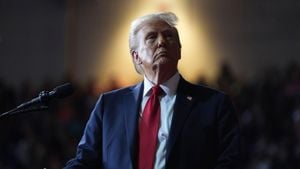Donald Trump’s selection of Pete Hegseth as his nominee for Secretary of Defense is under intense scrutiny as multiple allegations of misconduct surface. Hegseth, who has previously earned notoriety as a former Fox News host and veteran of the Army National Guard, now finds himself amid significant political and ethical controversies.
Within the GOP, some senators are expressing unease over the allegations against Hegseth, which range from sexual misconduct and alcohol abuse to issues related to financial mismanagement at veterans’ charities. Even veteran Republican lawmakers have voiced skepticism about his suitability for such a significant role within Trump’s upcoming administration.
These allegations escalated over the weekend when reports emerged, including one from The New Yorker, detailing troubling claims about Hegseth’s behavior during his time leading veterans’ organizations. A whistleblower's report revealed accusations of Hegseth being intoxicated repeatedly during work hours and highlighted financial irregularities. The fallout from this report has some senators questioning his fitness for office.
"I think some of these articles are very disturbing," remarked Senator Lindsey Graham (R-S.C.), underscoring the gravity of the charges leveled against Hegseth. Graham emphasized the necessity for Hegseth to defend himself adequately, noting the challenge his past actions present. Likewise, Senators Susan Collins (R-Maine) and Joni Ernst (R-Iowa), both of whom are considered pivotal votes, expressed reservations about Hegseth’s qualifications until the claims are thoroughly investigated.
Collins was particularly vocal about her demand for “an FBI background check to evaluate the allegations,” coupled with institutional procedures to assess Hegseth’s past, including public hearings. Given the seriousness of the accusations, many senators see these steps as necessary to maintain integrity within the armed services.
Hegseth’s challenges are not only coming from skeptical Republicans. Democrats are also raising alarms. Senator Richard Blumenthal (D-Conn.) characterized the reported drinking issues as "alarming and disqualifying," hinting at the potential ramifications for national security if such behavior were to continue within the Pentagon.
On the other hand, there is still vocal support for Hegseth, primarily from senators who assert he holds the capability to restore confidence within the military ranks. For them, the allegations are seen as sideline distractions from his proven track record and leadership potential. For example, Senator Cynthia Lummis (R-Wy.) dismissed the allegations as unrelated to Hegseth's professional capabilities, stating, “Again, they’re throwing disparaging remarks at someone who has earned credibility.”
Senator Markwayne Mullin (R-Okla.) expressed confidence, stating, "I think it’s difficult, but doable," referring to Hegseth’s confirmation prospects, highlighting the delicate balance between the existing allegations and the political favor he still commands.
Meanwhile, reports indicate President-elect Trump is considering potential alternatives for the position should Hegseth’s situation worsen. One name on the list is Florida Governor Ron DeSantis, who has previously shown more political light between himself and Trump. According to the Wall Street Journal, discussions surrounding DeSantis have been contemplative, rather than finalized, indicating the tenuous nature of Hegseth’s nomination.
Hegseth’s past allegations are not limited to workplace behavior. Last summer, it was revealed he had privately settled with a woman who accused him of rape, though he has consistently denied these claims. The timing of this latest disclosure compounds the challenges he faces, particularly as it hinges upon his character and public persona.
Hegseth’s current legal issues could be even more troublesome when considering the required vetting processes traditional appointees undergo. Trump set precedent by forgoing these formal procedures for Hegseth and other nominees, leading to accusations of irresponsibility and negligence concerning serious allegations.
While political backers urge the Senate to focus on Hegseth's operational capabilities, opponents argue the allegations cannot simply be brushed aside. They highlight the broader implications for military leadership and accountability, especially as the United States grapples with confidence issues related to its struggling veterans and military policies.
Overall, Hegseth's future as Defense Secretary hangs delicately between growing public skepticism and political alliances within the Senate. How the Republican party will manage these opposing forces remains to be seen as the confirmation process advances. Many wonder if the allegations surrounding Hegseth signal something larger about the current political climate and what standards are being set for future cabinet nominees.
With each passing day, the questions surrounding Hegseth intensify. The outcome of the Senate’s evaluation could alter not just Hegseth's set of circumstances but also the path forward for military leadership and Trump's cabinet overall. Will the allegations prove too hefty for him to manage, or can he rise above them to earn his rightful place at the helm of the Pentagon? Only time will tell.
All eyes remain peeled on Washington as more details unravel about Hegseth’s past, and the overarching question lingers: Can allegations of personal misconduct impact the political future of one of the highest-ranking military positions?



